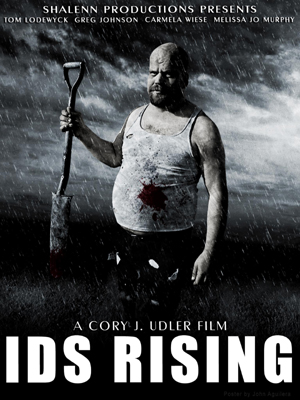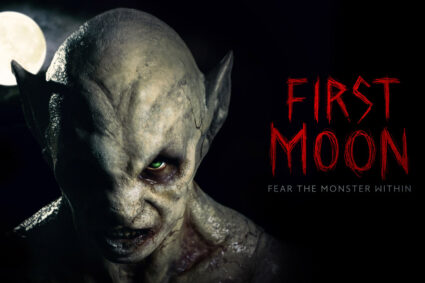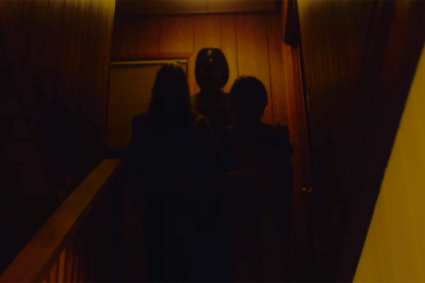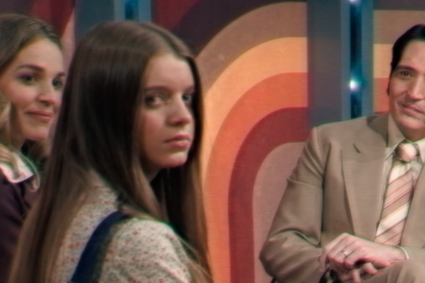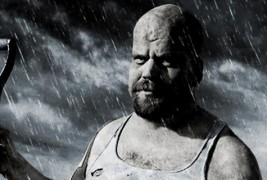
Greg Johnson works hard, he works weird, and he wouldn’t have it any other way. An intimidating man, mostly because he’s known for playing a depraved and homicidal maniac named Jeb Wayne, Greg-the-guy is thoughtful and funny. He’s someone who’s been put through the paces and has put himself through the paces by thespian-standards — he acts because he loves acting. Not much else is left to say, but wordsmithing is what I’m here to do.
Working with director Cory Udler on pure exploitation flicks, Greg’s become known for taking chances while starring in films such as Incest Death Squad, Incest Death Squad 2, and the forthcoming Incest Death Squad Rising, as well as roles in Mediatrix and even some shorts. And really, his risk-taking shouldn’t be surprising because Greg cut his teeth on various live stages, including some experimental ones such as the infamous Broom Street Theatre which was founded in Madison, WI by Stuart Gordon (Re-Animator, From Beyond, Stuck) back in the late ‘60s.
Ravenous Monster caught up with Greg to talk about crazy theater, Jeb Wayne, the new IDS flick, and what’s next for this voracious thesp-from-the-Midwest. Read on, Horror Fans….
RavMon: You’re probably best known to our readers for your portrayal of homicidal brother Jeb Wayne in Cory Udler’s Incest Death Squad films. Tell us how that opportunity came to pass.
Greg Johnson: Well, It all came about one morning a few years ago. I was online and asked Tom Lodewyck if there was any chance to get an extra part in a “Madison based film starring Lloyd Kaufman,” and within a day or two I was meeting with Cory. This meeting was supposed to be 30 minutes, but ended up being 2 1/2-3 hours. We just hit it off right off the bat. Through the grapevine I guess Cory’s words were, “If this guy can speak English he’s in.” I had an inkling that I would be working with this guy for awhile but little did I know that 3 years later we would still be working on projects together, but here we are with film number 4…or 5 including my short.
RavMon: IDS is absurdist in many ways, while IDS2 takes a much darker tone. IDS Rising is wrapping up post production right now and it’s scheduled to start playing festivals in October. What makes the third film in this franchise unique?
GJ: It is anything and everything an IDS fan could/would want. Cory said early on that this one was for the fans. And I fully believe that. Folks who are just walking into part 3 will want to see parts 1 and 2 for a point of reference. You’ll still have a good time but checking out the first two will serve the viewer well.
RavMon: How do you feel about having carved out a niche playing such a reprehensible character?
GJ: If I took any amount of time worrying about being “reprehensible” then it wouldn’t have been any fun and I wouldn’t be serving the story. The first IDS would be a lot different if I had been twirling my black mustache instead of being focused on where Jeb was going with a spring in his step and a gleam in his eye. I’ve always seen the series as a pitch black comedy of manners. So in some sequences I let the menace shine as well as the comedy. In my opinion you really can’t have one without the other. If you do it any other way it comes off as “one note” and really sloppy. With a script like Cory writes there is never the fear of this ‘cause more often than not the direction that you think may be different is exactly where he wants to go. It’s a mark of a crazy-good director when you’re playing into his hands and you don’t even know it.
RavMon: Were you a fan of horror and exploitation movies before you began starring in them?
GJ: I grew up watching Troma films. Toxic Avenger and Stuart Gordon’s Re-Animator were favorites of mine. But on the same token I was always waiting to see the newest Harrison Ford vehicle. So my tastes of films were really varied. The first film that really influenced me, as in ‘I was frozen in my seat a good three minutes after the credits stopped’ was Pulp Fiction. I also remember having the same reaction seeing a screening of A Clockwork Orange.
RavMon: What are the things that made the young Greg Johnson pursue acting?
GJ: I guess it was a lot of different things. I’ve always liked the idea of storytelling and once I got into shows at an early age, it just kind of became something that I did. As far as being attracted to experimental theater — that occurred when I was in Toronto at a theatre named “The Poor Alex Theater”. It was a small black box space and they were presenting a production of Aristophanes’ The Clouds. I can just recall being blown away by the size of the space and the fact that the show was really old — probably a few hundred years old. But it was still relevant to today. Then came college at UWO and later at Cambridge in the UK, and while these two factors didn’t help anything, it led me to believe that there could be a place for me in the racket when I was ready to do so.
RavMon: You have an extensive background in theater. How does your preparation differ between stage and film?
With stage there is no question of what is expected of you. You need to deliver your lines with technique and loudly for everyone to hear and use all the fundamentals. I usually learn the script inside and out, not resting much until it’s done. Then you get to sit with the show and explore for three weeks or longer if you’re lucky. With film it’s a different set of muscles. Personally, I think there’s merit to being 95% cold with the script and leaving 5% to chance and happy accidents. ‘Cause undoubtedly things are going to change on set much easier than they will during a live show. I think it serves the actor to be a lot more flexible when coming into film ‘cause you learn how to trouble shoot a lot quicker and more efficiently whether it involves the script or the direction. All this knowledge comes from getting my ass kicked on stage and in film earlier in life when I thought that it was okay to arrive not prepared. You’re still going to be slamming your head against a brick wall during either process but with some experience you learn to put up padding so it doesn’t hurt so fucking bad.
RavMon: Which medium do you prefer?
GJ: I’ve gone ‘round and ‘round with some theatre directors and some film directors about this very subject. I’ve come to the point where I would much rather do film. It’s much easier to maintain and it’s a fun medium to explore. At the end of the day, do you want your audience to number 60 on a good night or 6,000 and more worldwide? Plus, I think film is much more conducive to today’s society. Nine times out of ten you’re going to be able to see a trailer and recognize if it’s your bag or not. On the flip side, you walk into a production of Death of a Salesman and the lead sucks so right there you’re kind of screwed. You think you’re getting your veggies fresh and you find that they’re 100% rotten to the core.
The ego loves the stage ‘cause it’s instant gratification. Film is a different mindset and you realize that your performance is all in the hands of the editor and the director. Film is very subjective and theater is very objective. At the end of the day, if the audience leaves the movie or the stage theater talking for longer than five minutes about the ideas that were expressed then you’ve got something. Hopefully, it’s a good something, however, either way you’ve caused the audience to look inside and reflect and I think there’s merit in that. I would say that I prefer to direct stage rather than film, but I would have to say the opposite for acting.
RavMon: Who are your mentors and your biggest influences and why?
GJ: I’ve been really lucky to not be surrounded by bullshit artists. And if I discover they are, I remove myself from the situation very quickly. Enough time in the racket and you get a good nose for bullshit. Sometimes it takes years to latch onto it ‘cause the wolves dress up real nice and sheep-like. But the second their true selves are exposed — as hard as it is — sometimes ties need to be cut. Sometimes people have different motives and reasons behind their actions than what they’re willing to put out on display. Del Close once said, “If we aim for satire, the best we’re gonna get is burlesque.” I find this to be true of a lot of endeavors. People take themselves so seriously that they lose sight of what they are really up to and what they can achieve. Sometimes, regardless if you put flowers around a heaping pile of shit, it’s still going to be shit (continued after the picture).
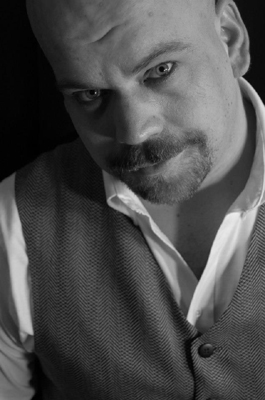
Also, if you spend too much time envelope-pushing or trying for shock value you’re going to end up with a beast that has no head or tail and, in the end, no substance.
I was taught early on that putting on a shitty accent or a false nose doesn’t get you out of the woods. You need to have substance behind your text and words; otherwise it all becomes a mess that no one will want to clean up. This being said, I have spent the last three years in a southern drawl so I’ve needed to break myself of the habit, that when my character gets angry I don’t drop into a shitty southern drawl.
As far as mentors go, Fred Alley and Paul Sills top the list. Both have passed, however, both taught me a lot about how to do it and do it right. Fred gave me the heart and Paul gave me a sense of wonder. He was also a 75-year-old man who could install fear in you just by looking at you. Neither one of them were the perfect human. However, what they taught me in the years being around them you couldn’t get in a class room if you tried. These guys were the real deal — real true-blue artists who lived, breathed and bled the art. I am very lucky to have known them.
I think the directors and actors at Peninsula Players in Fish Creek, WI – the nation’s oldest summer stock Regional Theater — Greg Vinkler, Carmen Roman, Joe Foust and the rest of the crew gave me a lot of insight into what it takes to be a professional in theater and film. Every two weeks or so we would change shows. This meant that the final night of the show, by the time the cast woke up, the set was struck and a new set was built and put into place. It also meant many nights working until 4 or 5 A.M. and sleeping until 9 A.M. to begin again. As far as a learning experience goes, this trumped all because either you were ready for strike and the new show or you weren’t and, alas, if you weren’t you would get your ass kicked on stage. It was a lot of hard, hard work but then the perks of the job came after the shows when you would get to do shots with Frank Galatti or you got to chat with Paul Sills. It was a very strange and surreal time.
Locally, [Madison, WI’s] Broom Street Theater has had a great influence on me. This is America’s oldest experimental/black box theatre. It was founded by Stuart Gordon of Re-Animator fame and Joel Gershman. Joel, who is no longer with us, was the best of the best – grumpy, sometimes mean, and held grudges. However if you caught him on a good day he was a very loving and kind human being. Sadly he didn’t speak to me for the last 2 years of his life because I tried out for a local theatre production that wasn’t the show that he was directing. I had the privilege of meeting and chatting with Stuart Gordon during the Madison Horror Festival a few years back. Anyway, after he left Madison way back when, Gordon created the Organic Theatre Company in Chicago which also included a little-known writer named David Mamet as well as actor William H. Macy. The rest, as they say, is history.
RavMon: What’s your dream acting gig?
GJ: It’s not a role, but just to be able to do films without any 9 to 5 job and be comfy. Not well off. Not rich. Just make enough to pay the bills and be able to pay the rent and put some money away in the bank. Maybe do some Cons to meet fans once in awhile and be able to do good work that people will want to see.
RavMon: Have you ever had difficulty shooting any of the more outrageous or violent material in Cory’s movies?
GJ: No. Again it comes down to serving the text and the mind set the character is in. Usually, during the filming of the IDS movies, if Cory had an idea that was in the script that I really dug and I wished to rack it up a notch or two, he would let me fly. It’s the positive experience of working with a director who you trust 100% and he trusts you as well. It goes both ways. But in short, I can’t recall a moment that was terribly unpleasant. If anything, it was the outside factors that made the series at times very difficult to make. From getting kicked off properties while holding pink flamingos to getting stopped mid-scene by state troopers, being asked by hotel owners if we were shooting a porno…hmmm, how did they know what a porn shoot looked like? But it all came down to the crew and director and a serious feeling of family that made us want to make these movies, come hell or high water.
RavMon: Which movie or movies frighten you the most?
GJ: Silence of the Lambs comes to mind as being one of the strongest. Bug, The Exorcist, the original Last House on the Left, Texas Chainsaw Massacre, Rosemary’s Baby. Most of these films I can watch once every 5 years or so and I’m good. Then there are fun classics which I think are scary as hell like Taxi Driver. I feel the best films happen when a director is crying out to you to make an investment on the journey that you’re taking. If all the questions are answered in a nice 90-minute little box with a bow on it, I’m going to lose interest.
RavMon: Name some of your favorite films, regardless of genre.
GJ: Shawshank Redemption, One Flew Over the Cuckoo’s Nest, Dr. Strangelove, A Clockwork Orange, Killing of a Chinese Bookie, Opening Night, Year of 13 Moons, American Beauty, Being There, Pulp Fiction, Jackie Brown, Goodfellas, Oldboy, Indiana Jones 1 through 3, and Lethal Weapon 1 and 2. Recently, I’ve really been digging Bob Goldthwait’s films, God Bless America and World’s Greatest Dad. I also like pretty much anything by Mike Nichols, John Cassavettes and Rainer Fassbinder.
RavMon: Your brooding visage has become iconic in horror/exploitation circles. For anyone who’s seen the IDS films, Jeb is instantly recognizable and elicits fear and unease. That speaks to a job well done. But do you ever worry about getting typecast?
GJ: Thank you. I’m not really scared of typecasting ‘cause nothing has really gone past the IDS/Jeb experience. If I’m lucky enough to work on another set that has as much respect, love, and dedication to achieving the stated goal, then lucky me. Doesn’t mean it can’t or won’t happen, but as for now that’s my answer.
RavMon: Have you had any memorable interactions with fans or otherwise who recognize you from the movies?
GJ: I have had the good luck of running into fans of the IDS series or stage stuff the second I’m thinking about giving up the racket. It makes you pause, consider and realize that if it wasn’t for these folks you would be nowhere with nothing. So thanks for taking the time out to say ‘hi’. Hopefully I’ve given something in return.
Probably the funniest moment I had was in New Jersey. I had gone out there with Cory to a convention when he was working with Full Moon Productions. Malcolm McDowell was there signing autographs and snapping pictures. I had waited in line to meet him and later in the day when he was leaving he recognized me from earlier and stopped by the Full Moon booth to chat. He was really polite and friendly, down to earth. I decided it was now or never so I gave him a copy of IDS1. The next morning when he entered, he didn’t say hello. All I got was a head nod. Part of me loves to believe that IDS creeped him out. You never know.
RavMon: What’s next for Greg Johnson?
There’s a lot of preproduction and work coming up. I’m involved with a film project called Hole In the Wall which is an anthology made up of three shorts. One by Cory, one by a great director/writer named Derrick Carey and one by Frank Anderson. I’m working with Derrick Carey on the wrap-around segment and it will be one hell of a ride for the viewer.
The Spade County Massacre, which I had a blast working on, will be released sometime this fall on DVD. You can find more information at www.spadecounty.com. There’s Jesus of Nebula: Alien Cannibal which I’m still shooting with Oklahoma City director, James Hawley. I’m also currently working on The Night They Hit Back, which is a fun short film by you.
RavMon: Guilty as charged.
GJ: I also just completed a bit for Demonoir with writer/Director Shaun Buehler. I’ll be shooting a movie called Cannibals with Joe Hollow and I’ll be shooting Rejection later this year, which is written and directed by a talented woman out of California named Irenia Guajardo. Also, I’m working on an adaptation of Checkov’s The Bear that will be filmed later this year and directed by Matt Kenyon, my cohort who can be seen in IDS Rising as well as Demonoir and The Night They Hit Back.
And of course there’s the IDS series. You can learn more at www.incestdeathsquad.com. IDS Rising will have its world premiere on October, 6th at the Oshkosh Horror Film Festival. Then it will play the Madison Horror Film Festival on November 3rd and 4th. You can find out more at www.madisonhorror.net. Also, pick something up at the IDS store at the website — your one stop shop for all your IDS needs!
